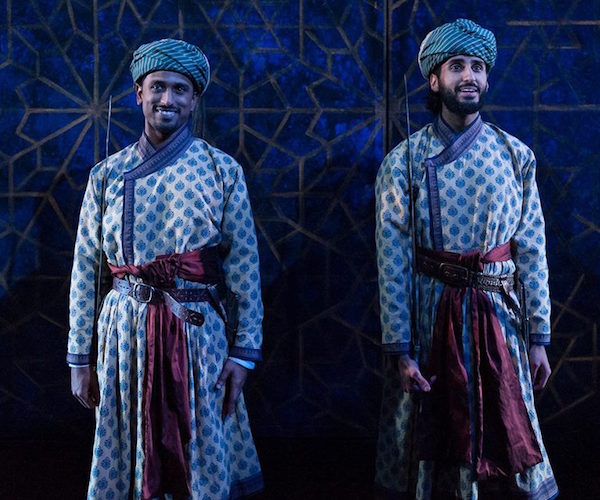Theater Review: “Guards at the Taj” — The Price of Possibility
Dramatist Rajiv Joseph probes the gentle sides of masculinity as well as the intertwined power of beauty and terror.
Guards at the Taj by Rajiv Joseph. Directed by Gabriel Vega Weissman. Staged by Underground Railway Theater at Central Square Theater, Cambridge, MA, through April 1.

Jacob Athyal and Harsh J. Gagoomal in a scene from the Underground Railway Theater production of “Guards at the Taj.” Photo: courtesy of Central Square Theater.
By David Cruz
As they await the unveiling of the Taj Mahal, two guards break a traditional oath of silence in order to pass the time. At turns silly and insightful, they reminisce about their days in the army, gossip about the emperor, ponder God and beauty, and discuss their ambition of serving the emperor as guards of the Imperial Harem. As dawn approaches, their chatter turns to action and they set down a very violent path. The frivolous becomes grotesque and the profound, cruel. Ustad Ahmad Lahauri built the Taj, but what have these men (and the society that they represent) made?
The guards call each other bhai, the Hindi word for brother. In truth, they are only childhood friends. Their closeness comes across powerfully as the actors fall into an easy rhythm. Humayun (Jacob Athyal) is a self-serious man from a powerful family who is acutely aware of just how little this influence has bought him. Babur (Harsh J. Gagoomal) is his clownish friend; the kind of man who would probably have failed the marshmallow test as a child. He arrives late to his post, and then proceeds to drag an unwilling Humayun from the safe tedium of their watch into a wild, sprawling conversation. Barbur wants to discuss the intricacies of a contraption he has dreamt up, a machine which will fly to the stars, which he calls an “aeroplat.” Humayan will later discuss the possibility of a “transportable hole,” which would allow one to pass through any barrier. Throughout the play, these visions will grow, strengthening the play’s exploration of the need for beautiful creations, including the world wonder that lies behind them.
In its first scene, the script juxtaposes the grandiosity of the Taj Mahal with the light humor of the guards’ dialogue. Athyal and Gagoomal serve as yin and yang for each other. Humayan is staid at first, but comes out of his shell at his friend’s insistence. Athyal plays Humayun as a straight man, but the actor gives us flashes of boyishness at key moments. In contrast, Gagoomal revels in acting the fool, running right up to the brink of obnoxiousness. The humor in his performance does more than entertain: it sets the stage for the traumatic action to come.
The plot’s turn toward the dark throws each character into stark relief, a grisly revelation that poses a tricky challenge for the performers. When tragedy arrives, Babur and Humayun find themselves punished for their playful curiosity by Emperor Shah Jahan, God and playwright Rajiv Joseph. Admirably, neither actor loses sight of the essence of his character through these dramatic shifts. Joseph’s strong dialogue and director Gabriel Vega Weissman’s confidence provide firm guidance. The actors don’t wallow in their characters’ role in the narrative’s cruel events. Instead they emphasize the infectious joy and meandering curiosity of their friendship. Athyal and Gagoomal are at their best when they are exploring possibilities, when they feel free to run with whatever exciting thoughts come into their heads. This trait survives in spite of the despair and anguish that dominate the later parts of the play. In fact, Weissman uses (perhaps even creates) quiet moments to echo and amplify these expressions of their camaraderie. It is unusual to find this kind of interaction in a black comedy; places where Joseph probes the gentle sides of masculinity as well as the intertwined power of beauty and terror.
The grandeur of the Taj Mahal is (necessarily) conveyed through the duo’s reaction to the building. This handicap puts considerable pressure on the artistic and design team and they are up to the challenge. The characters’ moments of awe are paired with sounds that are designed to disorient and discomfort audience members; for example, the sound of a flock of birds taking flight disintegrates into static. In contrast, the costumes, which are beautifully patterned, and other elements on the set ground the action concretely in history. High praise should be given to designer Grace Laubacher and her team in particular. They avoid depicting the Taj itself and instead focus on a set design that plays an important role in the storytelling; it is almost a character in the drama. The shocking visual transformations that take place on stage reflect the shifting emotional states of the characters. The Underground Railway Theater production is meant to be a sensory experience – and the set design provides plenty of visceral psychological resonance.
The lighting choices are subtle, a nuanced blend of shadow and light that serves the story’s contrasts well. This ambitious production keys into how the script looks at the conflicts between and within its characters and how they mirror the tensions in the creative process, the connections between construction and destruction. What makes possibility possible? Guards at the Taj serves up a compelling answer to that question.
David Cruz is a radio producer and civic technologist. He has been an associate producer at Human Media and Programming Director at WYBCX Yale Radio. He currently works for the Commonwealth of Massachusetts.

“The Price of Possibility.” Beautifully written review. More excited to see the show now. Please write more pieces.